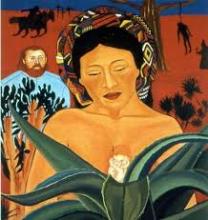Browse Primary Sources
Locate primary sources, including images, objects, media, and texts. Annotations by scholars contextualize sources.

Diapers
The material culture of early childhood in the 21st century is characterized by an emphasis on biological age and related levels of cognitive and motor skill development. All types of objects, including diapers, toys, food products, and clothing, are divided into categories based on the age-appropriateness of a particular object.
Polish Government reports on domestic unrest
Pessimism prevailed in this report prepared by the Polish Council of State assessing the general welfare of the country seven years after the national strikes that led to the Gdansk Agreements and four years after the lifting of martial law.
Gorbachev discusses De-Militarization
In the midst of a chaotic year of economic and political reforms, Communist Party General Secretary (and head of state) Mikhail Gorbachev addressed the politburo on the delicate issue of the Soviet military presence throughout Europe.
Conversations between the Catholic Church and the Polish Government
Poland was unique among Warsaw Pact countries in the degree of influence retained by the Catholic Church. But the church was also viewed as a powerful competitor to the state, and its leaders were among the first to be monitored and harassed during periods of social unrest.
Soviet Plan to respond to the Political Crises in the Soviet Republics
As Gorbachev’s reforms began to take hold across the Soviet Union, various Soviet Republics became hotbeds of nationalist, anti-Soviet movements The Georgian SSR was one of the centers of such acitivties with protests in Georgia reaching their peak on April 4, 1989, when tens of thousands of Georgians gathered in the city of Tbilisi.
Lech Walesa's Plans for the Roundtable Talks
In September 1988, Lech Walesa, leader of Poland's Solidarity Movement and later president of Poland following the collapse of communism (1990-1995), wrote this document a few months prior to the historic Roundtable Talks between party and state officials and the opposition that eventually took place in February to April 1989.
Lech Walesa's Plans for the Roundtable Talks
In September 1988, Lech Walesa, leader of Poland's Solidarity Movement and later president of Poland following the collapse of communism (1990-1995), wrote this document a few months prior to the historic Roundtable Talks between party and state officials and the opposition that eventually took place in February to April 1989.
Miscellaneous Jokes: GDR Jokes C
George Orwell once wrote, "Every joke is a tiny revolution." In state-socialist societies that had (or have) totalitarian characteristics, individuals found clever ways to carve out areas of freedom for themselves. These may have been areas of social freedom (with family and close friends), physical freedom (at one's small garden cottage), or mental freedom (through humor).
Excerpt from Anatoly Chernyaev's Diary
This personal account offers insight into the private sentiments of Anatoly Chernyaev, Mikhail Gorbachev's top foreign policy adviser in the 1980s. In this diary entry from May 2, 1989, Chernyaev showed deep concern about the instability and unpredictability of the direction in which Gorbachev was leading the Soviet Union.
Report on a Working Visit of Wojciech Jaruzelski to Moscow
Following the historic roundtable talks that took place in Poland from February to April 1989 between Communist and opposition leaders, Polish Communist leader Wojciech Jaruzelski met with Soviet leader Mikhail Gorbachev in Moscow to discuss the unfolding events in Poland and Polish-Soviet relations.
Cultural Contact in Southern Africa: Letters, Johanna Maria van Riebeeck
Johanna Maria van Riebeeck (1679-1759) was from an elite family in the Dutch colonial network. She was the granddaughter of Jan van Riebeeck, first Dutch Commander at the Cape, who went on to hold important posts in the Dutch government in Batavia (Indonesia), and the daughter of Abraham van Riebeeck, Governor-General of Batavia.
Southeast Asian Politics: Website, Sisters In Islam
The women’s movement has always been inherently global, but by the end of the 20th century there was a new burst of transnational women’s organizing as women used new technologies to network at home and abroad. Women’s movements are studied in the context of globalization, and Southeast Asian women’s “positioning” within this global context.
Southeast Asian Politics: Song, Philippine Feminist Movement
This song, entitled Maria and sung in Tagalog (a Philippine language), challenges cultural constructions of women as passive, as sex objects or domestic cooks. “Maria” is used as a generic term for woman. The song identifies heroines such as Lorena Barros, Gabriela Silang, and Tandang Sora. Barros founded MAKIBAKA in 1971, the first second-wave feminist organization.

Dona Marina, Cortes’ Translator: Painting, Santa Barraza
A representation of Malinche painted by a renowned Chicana visual artist and teacher from Texas. It depicts the beautiful, life-giving Malintzin, is a tiny image, crafted on metal, and meant to evoke ex-voto and other devotional images from Mexico. Malinche appears as a beautiful young woman with her gaze turned down so that she does not meet our eyes.
Writers of the Heian Era: Fiction, The Tale of Genji 2
The greatest work produced during the Heian era was The Tale of Genji by Murasaki Shikibu, lady-in-waiting to Empress Akiko. Considered the world’s first novel, Genji is written as an absorbing portrait of Heian court life, the splendor of its rituals, and aesthetic culture.
Soviet Dissidents and the "Brain Drain"
In the beginning of 1989, Henry Kissinger met with Mikhail Gorbachev for an informal conversation about the future of U.S.-Soviet cooperation, particularly concerning economic opportunities in the Soviet Union. The problem for U.S.-Soviet trade was the Jackson-Vanik Amendment to the 1974 U.S.
President-Elect Bush Informs Mikhail Gorbachev of His Need for Time to Formulate New Policies
Soviet-American relations thawed during the second term of President Ronald Reagan as he and Soviet leader Mikhail Gorbachev developed a personal rapport, signed the first treaty between the superpowers to reduce nuclear weapons arsenals, the Intermediate-range Nuclear Forces (INF) Treaty, and moved forward on further arms negotiations.
Plans for Reorganizing Solidarity
Prior to the historic roundtable talks that took place between February and April 1989 in Poland, preparations took place on many levels. In this letter dated January 20, 1989, a couple of weeks before the beginning of the roundtable talks, Andrzej Stelmachowski, a Solidarity activist, provided suggestions to Solidarity leader Lech Walesa on how to prepare for the upcoming discussions.
Mikhail Gorbachev Reports on the Trilateral Commission
During the significant changes that were brewing in the Soviet Union and Eastern Europe in the 1980s, Mikhail Gorbachev (leader of the Soviet Union) met with members of the Trilateral Commission, a nongovernmental organization founded in 1973 by private citizens of Japan, North America, and Europe to foster mutual understanding and cooperation.
The Soviet withdrawal from Afghanistan
On 25 December 1979, the Soviet Union deployed its army in Afghanistan, in support of the Afghan Communist government against a group of Muslim opponents. For the next nine years, only the active military involvement of the Soviet Union maintained any political control in Afghanistan, primarily through their control of the capital city of Kabul and its airport.